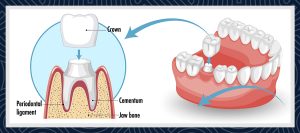Dental Crowns in Turkey

Dental Crowns in Turkey! An Ultimate Guide For Beginners
Looking for the best dentists? Turkey is your destination. Dental implants, teeth whitening, and dental crowns in Turkey are not only affordable but worth the money spent. But before we get to that, let’s learn a little about dental crowns.
A dental crown is a tooth-shaped “cap” for a damaged tooth. These prosthetic caps are to fit over a damaged tooth or implant. They restore strength, size, shape, and appearance. When fixed into place, the crowns enclose the entire visible part of a tooth that resides at and above the gum line.
Moreover, these crowns comprise ceramic, metal alloys, porcelain, and composite resin. Besides, they are custom-designed to match the shape, color, and size of the patient’s existing teeth.
Maintaining a natural look that enhances your radiant smile could be paramount to you. A competent dentist can guide you toward a suitable crown according to the damaged tooth and its alignments.
Explore their key features, types, exceptional care, and durability.
| Types Of Dental Crowns | Price Range Turkey | Price Range Europe | Price Range United Kingdom | Price Range United States |
| Metal (titanium) crowns | €500,00 | €835,00 | £900,00 | $855,00 |
| Gold crowns | €600,00 | €835,00 | £900,00 | $900,00 |
| Stainless steel | €650,00 | €800,00 | £934,00 | $900,00 |
| Porcelain veneers | €350,00 | €425,00 | £985,00 | $1.000,00 |
| Porcelain and metal hybrids | €500,00 | €600,00 | £965,00 | $1.000,00 |
| Resin crowns | €300,00 | €500,00 | £700,00 | $750,00 |
| Temporary crowns | €500,00 | €750,00 | £750,00 | $800,00 |
| Zirconia Crown | €685,00 | €835,00 | £820,00 | $800,00 |
What are its unique features?
Several unique features of dental crowns make them a fantastic choice for patients. Here are some of the most remarkable features that can save you from painful eating.
Durability
Dental crowns are durable and can last many years with proper care and medication. They can easily withstand the pressure of chewing and biting. Especially if you get dental crowns in Turkey, you can be assured of the quality. You will not regret it.
Customizable
Dental caps are customizable according to customers’ needs and preferences. Additionally, they fit perfectly over any damaged or implanted tooth when designed appropriately.
Restorative
Dental crowns are outstanding options for restoring decayed or damaged teeth. They support weak teeth and cover up large fillings. Your dentist will probably take a comprehensive test when you decide to get dental crowns in Turkey. After thorough analysis, only then the dentist will start the procedure. If restoration is needed, the dentist will take care of that with quality dental crowns.
Protection
Dental crowns protect weakened or damaged teeth by covering them. They also prevent teeth from further damage.
Versatility
Dental caps can resolve several dental issues. These issues may be large cavities, broken or cracked teeth, or discolored teeth.
Aesthetics appearance
Dental caps are to match the color and shape of surrounding teeth. Through this, they restore the appearance of damaged teeth and enhance the natural smile.
Dentists suggest a specific type of crown to the patient according to his damaged tooth, needs, and preferences. There are a variety of crowns available that may be customizable or not.
What Types of Dental Crowns Are Available?
For those with cracked teeth, dental crowns are the only favorable solution. Dentists suggest that these prosthetics prevent bacterial entry. This way, it delivers a sound body system. Dental crowns in Turkey are affordable and have many options.
Several types of dental crowns are available, each with unique benefits and features.
Let’s explore dental crown types:
Metal crowns
Metal crowns comprise various metals, such as silver, gold, and nickel-chromium alloys. Through this, they are strong, long-lasting, and often used for back teeth.
Porcelain crowns
Porcelain crowns are ceramic materials that resemble natural teeth in appearance. They are also durable and long-lasting. Besides, they can fit on the front and back teeth.
Zirconia crowns
Zirconia crowns comprise a robust and durable material that can withstand the forces of chewing and biting. They are often used for back teeth and to match the color of surrounding teeth.
Composite resins crowns
Resin crowns are specially made of tooth-colored material. It is possible to shape them to match the size and shape of the damaged tooth. Furthermore, they are less durable and are often used for the front teeth.
Porcelain-fused-to-metal (PFM) crowns
PMF crowns combine the strength of metal with the aesthetic appearance of porcelain. They consist of a layer of porcelain fused to the outer surface and a metal base.
When you decide to get Dental crowns in Turkey, your dentist will use the crown that best suits your tooth structure and gums.

Why Would I Need a Dental Crown?
You may need a dental crown when you face these situations, including:
To restore a broken tooth
A dental crown restores the function and shape of a fractured or broken tooth.
To protect a weakened tooth
In the case of trauma or decayed teeth, dental crowns protect them. The crown acts as a protective shield, preventing further damage to the tooth.
To cover a dental implant
Dental crowns are on top of a dental implant to replace a missing tooth.
To cover a misshapen or discolored tooth
Dental crowns improve the appearance of a tooth that is misshapen or discolored, restoring a natural-looking smile.
To support a dental bridge
Crowns anchor a dental bridge in place, filling the gap created by a missing tooth. When you get dental crowns in Turkey, your dentist will take a good look at your gums. If the gums are healthy, he will go ahead with the procedure.
To protect a tooth after a root canal
Crowns protect the weakened tooth after a root canal and restore its function.
Kinds of Dental Crowns
1- Temporary Crown
As its name indicates, a temporary crown will only remain in your mouth for a short time. These are typically made of composite or acrylic material. Temporary crowns protect the tooth while a permanent crown is being made.
Furthermore, these crowns are usually worn for a few weeks and then replaced with a permanent crown. Dental crowns in Turkey are available in many options. Your dentist will place the crown over your decayed tooth with an adhesive. Your dentist can remove it easily as it won’t be as strong as a permanent crown.
2- One-day crowns
As their name suggests, the dentist can make and place them in one appointment at the lab. Computer-aided design and manufacturing (CAD/CAM) is used to manufacture these crowns.
You can get your ceramic crown the same day you visit the dentist’s lab.
3- Onlays or Three-fourth crowns
Onlays are partial crowns that enclose only a portion of a tooth. These crowns don’t cover as much of your underlying tooth as traditional crowns. They are only used when a full crown is not needed. Furthermore, when the damage only affects one or two sides of the tooth, your dentist will remove the damaged area and perform a reshaping of the tooth to prepare it for the crown.
Your dentist can help you determine which type of crown is best for your specific needs and preferences.
Now let’s explore what steps are involved in a dental crown procedure.

What Steps Are in Preparing a Tooth For a Crown
A tooth crown procedure usually requires two visits to the dentist. The first step involves examining and preparing the damaged tooth. The second step involves the replacement of a permanent crown.
First Visit: Examining and Preparing the Tooth
At a first visit to the dentist, the dentist will typically begin by examining and preparing the damaged tooth. Next, the dentist will take X-rays of the damaged tooth to check the roots of the tooth receiving the crown and the surrounding bone. Through this, he gets a better idea of the extent of the decay.
Furthermore, he will thoroughly examine the tooth, looking for any signs of cracks, decay, or other damage. If there is a risk of injury or infection to the tooth’s pulp, a root canal treatment may be first performed.
Before making a crown, your dentist will numb the tooth and gum tissue around the damaged tooth. Then, the tooth receiving the crown is reshaped for a chewing surface and to make room for the crown. Further, if a large area of the tooth is missing due to damage, a dentist will use filling material to “build up” the tooth to strengthen the crown.
The impressions of the teeth above and below make sure that the crown will not affect your bite. Then, according to impressions, there will be the manufacturing of crowns in the dental lab. These crowns are according to the patient’s requirements and preferences. Temporary crowns usually consist of acrylic and are cemented in place using porcelain cement.
Secondary Visit: Receiving the Permanent Dental Crown
During the second visit, your dentist will remove the temporary crown and monitor the color and fit of the permanent crown. If everything is suitable, an anesthetic is used to sedate the tooth, and a new crown will be permanently carved.
What Factors Your Dentist Must Consider
When choosing a material for your crown, your dentist must consider such factors as:
- your damaged tooth location
- how much of the decayed tooth will show when you smile
- position of gum tissue
- the function of the damaged tooth that requires the crown
- how much natural tooth is remaining
- color of the surrounding perfect teeth
You can also suggest materials according to your personal preferences.
Let’s explore dental crowns’ durability.
How Long Do Dental Crowns Last
The lifespan of a dental cap can vary depending on several factors, such as the material used in crowns, the patient’s oral hygiene, and their dietary habits. Furthermore, mouth-related habits, such as fingernail biting, chewing ice, and grinding their teeth.
On average, dental crowns can last between 5 to 15 years. With proper care, the lifespan of dental crowns increases.
However, some crowns can last up to 25 years or longer if the patient takes good care of their oral health.
To increase the lifespan of a crowned tooth, you must consider its exceptional care.
Does a Crowned Tooth Require Any Special Care
A crowned tooth requires special care to ensure its durability and prevent decay or damage.
Here are some tips for caring for a crowned tooth:
Avoid sticky or hard foods
Sticky foods, such as chewing gum or caramel, can pull the crown off the tooth. Additionally, chewing on hard foods such as candy or ice can damage the crown.
Maintain good oral hygiene
Brush your teeth regularly to prevent plaque buildup around the crown.
Consider fluoride treatment
Fluoride helps strengthen the crown and prevent decay around the edges.
Visit your dentist regularly
A visit to your dentist regularly can monitor the health of your crown. In addition, he will inform you of any signs of decay or damage.
Are Dental Crowns Worth it?
Getting dental crowns in Turkey can be a highly effective solution for decayed or broken teeth. It depends on the patient’s needs and situation. These crowns can restore the functionality of broken or damaged teeth and allow you to speak and chew normally.
You can wear these crowns for 5 to 15 years with proper care. Dental crowns with solid ceramic materials enhance their durability. Moreover, they protect weakened or decayed teeth by covering and strengthening them.
However, there are also some potential cons of the crowns, such as the procedure’s cost and discomfort after the treatment.
Ultimately, it’s totally up to individual situations, goals, and needs. Your dentist can help you weigh the pros and cons of making a decision.
What Problems We Faced With Dental Crowns
Sensitivity
Dental crowns can create sensitivity after the procedure. That is primarily due to wearing off the anesthesia. That can result in heat and cold sensations. Then, your dentist may recommend toothpaste designed for sensitive teeth. Pain or sensitivity mainly occurs when you bite down after the treatment. That means your crown is too high on the tooth. In that case, you must visit your dentist.
Allergic reactions
Metal alloys make metal crowns. Due to the crown’s metal composition, you can face several allergic reactions. But these reactions are extremely rare.
Gum diseases
When a crown does not fit correctly, it can create a space between the gum line and the crown. This way, there will be an accumulation of bacteria and plaque. That can cause inflammation and infections in the gums known as gingivitis.
If you experience any symptoms of gum disease, such as swollen gums, bad breath, or bleeding when brushing, contact your dentist.
Loose Crowns
Loose crowns comprise of porcelain cement usually wash off their cement, and the crown becomes loose. It allows bacteria to leak in and cause decay in the teeth.
Crown falls off
Crowns fall off primarily due to the decaying of the underlying teeth and the loosening of the cementing material used to place the crown.
Dark line on crowned tooth
If you have a porcelain-fused-to-metal crown, there are more chances of a dark line on the crown. This dark line is due mainly to metal. Dark streaks can reduce your aesthetic, and your dentist can replace them with a new crown.

How Much Do Dental Crowns Cost?
The costs of dental crowns can vary depending on several factors, such as the material used to make the crown, the location of the dental practice, and the complexity of the dental work involved. On average, a dental crown can cost from $800 to $1500 or more per tooth.
When we select a crown according to material, it is different. For example, porcelain crowns are more costly than gold crowns. Gold crowns are typically more expensive than porcelain-fused-to-metal crowns.
Sometimes the cost may be partially covered by dental insurance. Moreover, some dental practices offer financing options to help make the cost of dental treatment more manageable.
The cost of dental crown procedures in the United States is so high that everyone can’t afford them. So getting dental crowns in Turkey is not only the best option in terms of money but also in terms of quality.
Why Get Dental Crowns in Turkey?
There are several benefits to getting a dental crown in Turkey, including:
Cost-saving
As you know, 1 lira is equal to $0.053. The dollar-lira difference could make the procedure more affordable for those traveling from countries with stronger currencies. Turkey offers high-quality dental care at a lower cost than other countries.
Advanced technology
Many dental clinics in Turkey use advanced technology, such as CAD/CAM systems. These systems create durable and precise dental crowns.
Experienced dentists
Turkey has a well-established dental tourism industry, with many highly qualified and experienced dentists. Further, they offer a range of dental crowns.
Vacation opportunity
Turkey is a popular tourist destination. It is known for its elite history, vibrant culture, and stunning scenery. Combining a dental procedure with a vacation can surely be an appealing opportunity for many people.
However, it’s crucial to research and choose a reputable dental clinic and professional dentist in Turkey. Through this, you receive the best possible outcomes.
Final Thought
Getting dental crowns in Turkey is an effective solution for restoring weakened or damaged teeth. These are custom-based caps that encase the visible portion of the damaged tooth. Furthermore, it provides support and protection from further damage. As dental crowns comprise various materials, patients choose them according to their needs and preferences.
Dental crowns are reliable and long-lasting. However, they require proper maintenance and care to ensure their longevity. If you want to enhance their lifespan, then you must avoid chewing on hard things. Moreover, visit your dentist regularly for checkups.
FAQs
What are dental crowns, and why are they used?
Tooth-shaped caps over a decayed tooth to restore its shape, strength, size, and appearance. Dental crowns protect the weakened tooth from further damage. They also restore a damaged or broken tooth and support it with a large filling.
What are dental crowns made of?
Dental crowns comprise various materials, like porcelain, metal alloys, resin, and combinations of these materials.
Why are dental crowns used?
Dental crowns protect and restore decayed teeth, covering them from further damage. Moreover, they improve the appearance of a tooth or serve to support a dental bridge.
How long do dental crowns last?
Caps can last 5 to 15 years or more with proper care and maintenance. Lifespan usually depends on the patient’s oral hygiene, dietary habits, and crown material.
How do I care for my dental crown?
To care for a dental crown, brush your teeth twice a day. Practice good oral hygiene habits. Avoid biting down on hard things. Regular checkups can enhance your crown’s lifespan. Usually, when getting dental crowns in Turkey, dentists keep their patients well-informed.
Are there any risks related to getting a dental crown?
Dental crowns are safe, but procedures have some risks, such as infection, sensitivity, and damage to the underlying teeth.
Is getting a dental crown painful?
The procedure for a dental crown usually involves two visits. The first one is totally about examining and preparing the tooth. The second visit involved placing the permanent crown. The entire procedure isn’t painful, as the dentist uses anesthesia to numb the root of the decaying tooth. But, after the process, dental crowns can cause sensitivity to infections, etc.
Can dental crowns be replaceable?
Yes, dental crowns are replaceable if damaged, worn out, or loose. The dentist will need to remove the old crown and prepare the tooth again before placing a new dental crown.
 Whatsapp
Whatsapp
